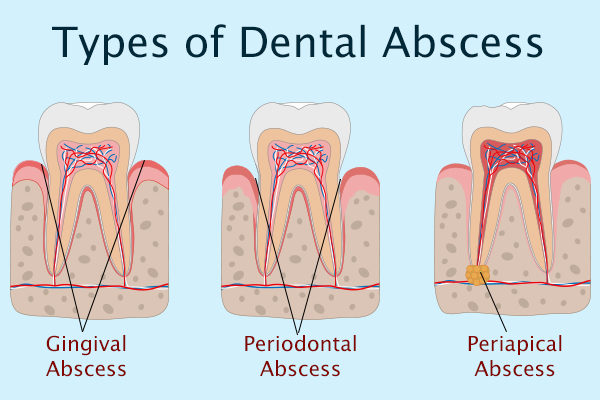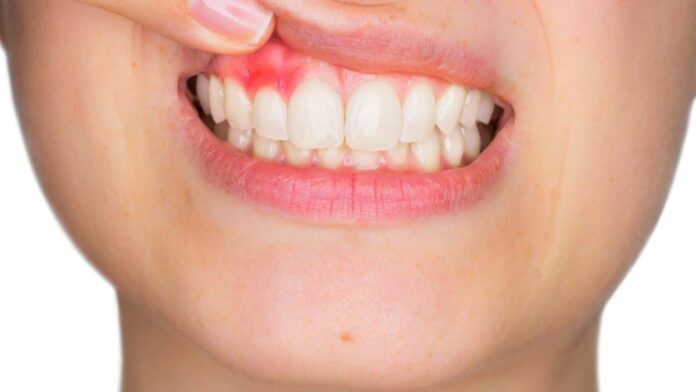A dental abscess is also referred to as a tooth abscess and is a bacterial infection that starts as gum infection, tooth cavity, or tooth infection. According to this dependable dentist in Mathews, it is the accumulation of pus in the teeth or gums due to an infection. This infection spreads to other parts like the throat, face, mouth, and face. Dental abscess affects people with poor dental hygiene and doesn’t go for regular dental checkups.
Types of Dental Abscess
There are three main types of tooth absence:
1) Periapical Abscess
A periapical abscess is a condition that manifests after pus accumulates at the infected tooth’s root. It is caused by the infection in the tooth root spreading to the surrounding tissues. The human body fights this infection and deploys millions of white blood cells to the infected area to fight the bacteria and prevent them from spreading to other body parts.
This pus results from the accumulation of dead bacteria and white blood cells at the infected site. This pus may spread from the tooth root and pass through the bone into the gum tissues causing the gum near the tooth root to swell. Accumulation of pus at the gum causes swelling and also causes pain, especially when chewing.
In addition, if the condition remains untreated, this infection may spread further to sensitive soft tissues, a condition called cellulitis. The cellulitis condition may cause swelling in the floor of the mouth, the jaw, or the cheek. Furthermore, this infection may spread to the airway, thus becoming life-threatening.
2) Periodontal Abscess
Periodontal is described as a localized accumulation of pus in the periodontal pockets. It is a more common condition in patients who previously had periodontal pockets, and the pus accumulation destroys the walls of these pockets. This disease is caused by gum infection or may result from oral injury.

3) Gingival Abscess
A gingival abscess is a bacterial infection that affects the gums and leads to a pus-filled sac around the tooth. However, the initial stages of this condition are asymptomatic, and the situation may remain undetected for an extended period. It is thus essential to go for regular medical checkups because advanced stages of this condition may lead to permanent tooth loss if it remains untreated.
Causes of Dental Abscess
- Poor oral hygiene
- Gum diseases
- Tooth decay
- Mouth Injuries
- Bacterial buildup in an infection site
Signs and Symptoms of Dental Abscess
Despite the difference in the causes and manifestation of the different dental abscesses, they all have similar signs and symptoms. An abscessed tooth’s main signs and symptoms are severe pain near the tooth or the gum. If it remains untreated for long, the pain may be uncomfortable and restrict you from daily activities.
Other signs and symptoms include:
- Discoloration and loosening of the teeth
- Bad breath
- Swollen and painful gums
- Pain when biting or chewing food
- Tooth sensitivity
- Facial swelling
- Bad breath and bad taste in the mouth
- Sharp pain emanating from the jaws, ears, or neck
- Swollen or painful lymph nodes
There are cases where the abscess ruptures, and in this case, patients feel immediate pain relief. It would be better to learn more about dental abscesses to understand the causes, symptoms, and preventive measures. This will help to keep your teeth healthy.
Treatment
Abscess treatment aims at curbing the infection and restricting it from spreading to other areas of the body. Treatment procedures focus on clearing the pus in the infected area and relieving pain associated with the inflammation resulting from the pus accumulation. Depending on the case in question, the dentist may start with a dental X-ray to see if the infection has spread to other parts.
Different treatment methods are used in the treatment of a dental abscess. The main treatment methods include: Draining the pus in the abscess in this procedure, the dentist cuts and drains the already formed pus in the inflammation. The dentist then washes the infected area with saline solution to ensure no further infection.
In addition, the other popularly used treatment procedure is the root canal procedure. It is a procedure where the dentist drills the affected tooth and removes any affected pulp. Next, the dentist fills in this left cavity replacing the extracted part.
Finally, the dentist may describe oral antibiotics that may help clear the infection before it spreads to other areas of the body. Antibiotic treatment may take a total of five days to reverse the condition and curb it from spreading to other healthy areas.
Complications Associated with Dental Abscess
It is essential to immediately book an appointment with your dentist if you have an abscessed tooth. There are cases where the abscess bursts independently, and you get immediate pain relief. However, you will be needed to get dental treatment to clean that area and avoid a resurgence of the abscess.
If the condition remains untreated for an extended period, the infection may spread to other parts, including the floor of the mouth, neck, head, and brain. In other rare cases, this infection may cause sepsis, a severe disease complication.
You should seek immediate medical attention if you have an abscessed tooth accompanied with the following signs and symptoms:
- Swelling on the face
- Difficulty when swallowing food
- Rapid heart rate
- High fever
These signs show that the infection has advanced and spread to other parts of the body or even the brain.
Prevention
Avoiding tooth decay is one of the primary methods of preventing tooth abscesses. People are advised to take good care of their oral health to prevent tooth decay. Some of the preventative measures to take include:
- Brushing your teeth at least twice per day using fluoride toothpaste.
- Replacing your toothbrush after every three or four months whenever bristles are worn out.
- Avoid eating sugary products that lead to the manifestation of oral bacteria.
- Use antiseptic or fluoride mouthwash to avoid tooth decay.
- Drink fluoridated water.
There are many undetected and untreated abscesses because the initial signs and symptoms are mild, and many ignore them. Thus, it is recommended to regularly visit your dentist for check-ups even without exhibiting any symptoms.






































